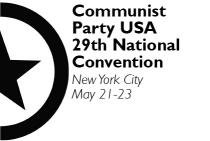 This article is part of the discussion leading up to the Communist Party USA’s 29th National Convention May 21-23, 2010. CPUSA.org takes no responsibility for the opinions expressed in this article or other articles in the pre-convention discussion. All contributions must meet the guidelines for discussion. To read other contributions to this discussion, visit the site of the Pre-Convention Discussion period.
This article is part of the discussion leading up to the Communist Party USA’s 29th National Convention May 21-23, 2010. CPUSA.org takes no responsibility for the opinions expressed in this article or other articles in the pre-convention discussion. All contributions must meet the guidelines for discussion. To read other contributions to this discussion, visit the site of the Pre-Convention Discussion period.
All contributions to the discussion should be sent to discussion2010@cpusa.org for selection not to the individual venues.For more information on the convention or the pre-convention discussion period, you can email convention2010@cpusa.org.
A central mystery of the collapse of the Soviet Union was why the Central Committee of the Communist Party of the Soviet Union (CPSU) more or less passively allowed Mikhail Gorbachev and those around him to dilute Marxist-Leninist ideology, weaken the Communist Party, and finally dismantle socialism itself. This mystery was perfectly symbolized by the life of Yegor Ligachev, the CPSU’s deputy leader in the first years of Gorbachev and a thoroughgoing Marxist -Leninist, who supported the early reforms by Gorbachev, particularly those aimed at enhancing openness, free discussion and modern technology, but completely opposed the ultimate direction of perestroika- the marginalization of the CPSU, the shattering of the Soviet Union, and the turn toward capitalism. Written in the early 1990s, Ligachev’s memoirs make for painful reading. His memories are filled with sadness and regrets at what happened to the party and socialism and with the “heavy heart” at “how unfortunately prophetic” he was. Yet, his recollections are devoid of any insight as to why the collapse of socialism occurred or what he and other like-minded Communists might have done to have changed things, how they might have acted differently.
Ligachev’s obtuseness sheds considerable light on the mystery of the Central Committee’s apathy. At the very time, when Gorbachev was undermining the Communist Party, including its leadership role and the democratic centralism, Ligachev was blinded by his own deference to the Party’s leader and hamstrung by his commitment to democratic centralism. A rather pathetic anecdote was related by Ligachev himself. While still a member of the Politburo, Ligachev said he “foresaw the tragic course of events and could not remain silent.” So, what did he do? He wrote a letter to Gorbachev detailing his criticism and concerns. Gorbachev “shelved” his letter and refused to send it to the Central Committee. Ligachev said that Gorbachev’s refusal to circulate his letter was “something so unbelievable and astounding…that I still can’t grasp it.” The really unbelievable and astounding part of this story is that Ligachev thought the only way to oppose policies that were leading the party and nation to disaster was to appeal to the author of those policies. The pitiful thing about this story is that Ligachev’s respect for the leader of the Communist Party and for the party’s democratic centralism was so strong it actually facilitated Gorbachev’s destruction of the CPSU. Moreover, his deference was so strong that years later he believed that in writing to Gorbachev, “I did all I could to prevent misfortune.”
Today, the CPUSA in undergoing a transformation in many ways parallel to what happened in the Soviet Union twenty years ago. New thinking, new technology, and restructuring are all the rage. The Party leadership is rapidly jettisoning “old ideas” and vocabulary -Marxism-Leninism, dictatorship of the proletariat, vanguard role, independent political action, class struggle, racism, imperialism, internationalism. According to our leaders, class struggle is not a “useful” idea and “the Communist plus” should be “given a decent burial.” Last month, the Party leaders did not support the anti-war demonstration in Washington, D.C. and last week did not support the labor/immigrant rights May Day rally in Foley Square and yesterday did not support the disarmament march and demonstration at the UN. Meanwhile, the Party leaders have abandoned independent mass work around women, racism, and peace and instead walk lockstep behind the Democratic Party and the AFL-CIO . The leadership stopped print editions of the newspaper and theoretical journal, closed the book store, shut the Reference Center for Marxist Studies, gave away the archives and library, and rented out more and more space in the party headquarters to commercial enterprises. Judging by the size of the last convention five years ago in Chicago (about 500 delegates and guests) and the forthcoming convention in New York (about 200 delegates and guests), these new ideas and policies have resulted in people voting with their feet, and those feet are not trampling a path to our door. Membership is falling and members are languishing. For those of us who pride ourselves on understanding something about the movement of history, the ultimate end of these developments should be clear.
Unless the passivity of leading comrades changes in the coming weeks, it is likely that in the coming years some will end up muttering Ligachev’s words, “unbelievable,” ” astounding,” ” I still can’t grasp it.” If, they say as well, “I did all I could to prevent misfortune,” they will be just as pitiful and wrong as he was.


 Join Now
Join Now